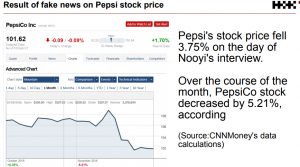Corporate reputation is one of the most vital elements that most business entities strive to achieve. In fact, all the brands that exist and operate in the dynamic market try to strengthen their corporate reputation. The subject has captured the attention of numerous marketers in recent years as it can have a major implication on the survival and sustainability of a business. The literature review that has been presented here highlights the relevance of corporate reputation in the 21st century. Maintaining corporate reputation is surely not a cakewalk. Businesses have to be on their toes at all times so that they can keep a tab on the information that circulates in the market relating to their brand. A number of academic sources have been referred to for the purpose of assessing how brands manage themselves and their corporate reputation in the cut-throat competitive era.
A number of examples have been presented in the literature review to show how misleading information can have a detrimental implication on a brand and its overall profitability. Although reputation is an intangible component, studies indicate that a good reputation in the market can enhance corporate worth and give a sustainable competitive advantage to a business. At the same time, if the corporate reputation is adversely affected it can have a negative impact on a brand.
Introduction
The 21st century has given rise to numerous elements in the business setting such as technological innovation, global brands, and social media. In addition to these constructive things, there is a major threat that looms before brands and businesses. The multiplication of fake news is taking place at an alarming rate. It is making extremely challenging for brands and marketers to have a sustainable existence in a dynamic and competitive market setting. The fake news that spreads just like wildfire has major implications on society as well as brands. In the digitalized era, the scale of fake news is unparalleled. It is in fact enabled and driven by the internet (Patterson, Wilkins & Painter, 2018).
Brands have to carefully devise their strategic move so that they can effectively manage themselves in the age of fake news. In the cut-throat competitive market environment, any fake or incorrect piece of news can have a detrimental impact on a brand and its very existence. They have to make strategies so that they can maintain their corporate reputation. In the current era, brands are focusing on brand management as there arise threats in the age of fake news. The steps and measures that they take are of vital importance as they help in building and managing of favourable corporate reputation and constructive corporate brand. In the era, when fake news spreads from one corner of the globe to another, brands have to strive extra hard to safeguard their corporate identity and reputation. In the golden age of advertising, fake news can make or break a brand in no time. So brands need to work on their business reputation so that their relationship with the market audience can be strengthened. A number of business organizations that have been directly affected by fake news have been captured here.
Literature Review
Corporate Reputation
The term ‘corporate reputation’ can be defined as a stakeholder’s assessment of a business organization over a course of time. Such an evaluation can be based on his or her direct experiences with the business, or any other form of communication and that gives an insight into the business’ actions (Audrezet, De Kerviler & Moulard, 2018). The reputation that a business has in a market setting can have an impact on various elements such as the level of customer satisfaction, the quality of the product or service, the level of employee satisfaction, vision and leadership in the organization, the corporate social responsibility and the market position (Gotsi & Wilson, 2001). A good and decent reputation of a business can give it a competitive advantage whereas a poor reputation can erode its profitability and threaten its existence. According to Whitman, words play a vital role to strengthen the level of credibility and trust in the prevailing times. A misstatement is inevitable but marketers need to be careful while sharing information as any kind of misleading information can undermine their credibility and erode the overall trust (Prweek.com, 2019).
In the era of technology and the internet, fake news has a detrimental influence on the corporate reputation of brands. In fact, in the past few years, a number of marketers have vanished from the market scene or their sales have significantly declined due to fake news. Some of the popular brands whose corporate reputations have been adversely affected in the past are McDonald’s, United Airlines, and other business firms. According to Pierre R Berthon, brands have a complicated relationship with fake news. Brands are said to be fuel fake news and at the same time get burnt by them (Beverland, 2005). It is important to understand that brands are implicated by fake news in numerous ways. According to Sihite and Sule, corporate reputation can be used as a vital tool by marketers as it can help them to gain a competitive advantage and strengthen the level of trust in the market setting. The massive PepsiCo brand was also a victim of Fake news. The happening shows how fake news or any form of misinformation can have an adverse implication on a business entity (Sihite et al., 2016).
In the year 2016, just prior to the U.S elections, the stock value of Pepsi fell by about 4 % for fake news (Gotsi & Wilson, 2001, p 2). The fake news was that the CEO of Pepsi Indra Nooyi had told Donald Trump’s supporters to “take their business elsewhere”. This simple instance shows the power of fake news and how it can give rise to serious consequences for a business undertaking. The impact of the fake news on PepsiCo’s stock performance has been highlighted below.

Source: (Sihite et al., 2016)
Fake news and Brand Management
In the past, a wide range of research studies has been carried out to ascertain the impact of fake news on brand management and brand performance. According to Bill Whitman, it takes a number of years or even decades for an entity to build integrity and credibility. But fabrication or fake news that is portrayed by media has the power to erode the trust completely. When fake news relating to a brand spreads in the market setting it adversely affects consumer trust (Ding, 2011). The damage that is caused to a business due to obscured information makes it extremely difficult for it to rectify. In order to build a strong trust that will not get affected by fake news, business undertakings have to establish a transparent communication model. It can act as the main pathway that will enable the flow of sustainable words that matter the most in the dynamic and evolving market setting. Some of the key elements that businesses and bands need to carefully take into account in order to deal with fake news include the utilization of legal third-party sources for the purpose of communicating and interacting with the target market audience, focusing on the ultimate brand value and establishing a trustworthy and healthy relationship with the audience. Such a holistic approach can help brands effectively manage themselves in the era of fake news.
In order to strive in spite of the high volume of fake news that erodes the market setting, a brand needs to introduce an effective brand management strategic approach. According to Jason Ratcliffe, it is not easy for a brand to safeguard the brand name in the prevailing ‘fake news’ economic setting. In the past decade, the rising popularity of social media platforms has further intensified the spread of fake news which affects brands to a significant extent. In order to have proper control over such false news that is shared on numerous platforms, brands need to gear up so that they can have a check over their online corporate reputation. The prevalent state of fake news creates numerous opportunities and challenges for business undertakings (Gotsi & Wilson, 2001). Thus they need to carefully handle the situation so that the adverse implication of fake news can be optimally managed.
Managing brands in the era of fake news
Since fake news affects brands, customer experience, and overall brand experience, brands of the 21st century are devising strategies so that they can properly manage the corporate reputation which impacts their market performance (Gabrielli, Grappi & Baghi, 2012). One of the most vital elements that are being designed to tackle fake news is the communication model that is used by a business undertaking. In order to beat fake news and sophisticated forms of disinformation, brands can make the optimum use of direct communication so that inappropriate or incorrect news relating to their business activities can be addressed. According to David Lazer and Matthew Baum, in order to optimally deal with fake news, there is the need to adopt a multidisciplinary approach. It can help brands to have proper control over their corporate reputation and well-being in the competitive market environment (Lazer et al., 2018).
Countering fake news is not a cakewalk as these pieces of information spread rapidly among the market audience. As per a few researchers, brands can get support to deal with fake news if suitable legislation is introduced to curb the menace. Many business undertakings have been trying really hard to effectively combat the instanced of fake news (Gould & Skinner, 2007). For example, Facebook the popular social media platform has strengthened machine learning and at the same time, it has been trying to remove accounts that intensify the occurrence of fake news (Patterson, Wilkins & Painter, 2018).
According to Riezebos et al, brands need to introduce suitable measures and techniques so that they can effectively manage fake news and other kinds of fake elements that can have a negative impact on the brand (Riezebos et al., 2003). Brands need to work alongside credible partners as they can play a vital role to protect the business from exposure to such untrue elements. As per Kotle(2009), the next strategy that brands can adopt in order to safeguard and strengthen brand management in the era of fake news is to take the help of reliable communication networks so that information can be spread uniformly without any form of distortion. (Kotler, 2009). This separation strategy will basically make the brand more independent in nature and it will be able to eliminate or remove the brands which aren’t exactly aligned with the business undertaking. The last step that has been proposed in the research study is that business undertakings need to make sure that their partners adhere to the Federal Trade Commission (FTC). For instance, if someone is receiving compensation from a brand for promoting its commodities and services, it must be disclosed in a clear and conspicuous manner.
Analysis of the Cases
There are a number of business undertakings that have succeeded to tackle fake news and on the other hand, there are brands that have failed to manage their brand reputation due to fake news. This section basically captures two business organizations namely Pepsi Co and Facebook. These business concerns have been affected by fake news in the past and they have succeeded to tackle the distorted information that had been doing rounds in the vast market setting.
Fake news relating to PepsiCo brand – Kurkure Plastic incident
The PepsiCo brand has had its share of fake news and misinformation which have had an adverse implication on the brand and its overall performance in the dynamic market environment. For instance, the fake news that has been making rounds is that Kurkure corn puffs are made of plastic materials (McNair, 2017). Such absurd news had confused the market audience for quite some time. In order to effectively tackle the fake news, the PepsiCo brand presented proof to show that the product was safe to eat. The brand introduced a ‘caution notice’ on its official brand site which guaranteed that the consumption of Kurkure was safe and it did not contain any plastic material in it. In order to give detail about the ingredients that are involved in the product, the brand listed all the ingredients as well. In September 2017, the brand also held an event so that female blogger could come and view the entire production process that is followed by it to make the snack item (McNair, 2017). In order to give a tough reply to the fake news, the brand also made sure to present scientific proof in the market. It received clearance from the All India Institute of Medical Sciences (AIIMS). The body stated that the product did not contain any plastic and it is safe for human consumption. The brand has even gone a step ahead and it has sued social media platforms that make plastic jokes (Patterson, Wilkins & Painter, 2018). This instance shows that the business organization succeeded to tackle the fake news that had affected the overall integrity and corporate reputation of the brand and its offerings.
Fake news relating to the Facebook brand
The social media platform has been involved in fake news in the past which has affected its credibility. As this communication platform is used by millions of users to interact and engage on a daily basis, a number of fake news and incorrect information arise here. The Facebook business has been trying really hard to keep a tab over the fake news that comes to the surface in the platform. But its strategy to deal with the issue has been termed as a ‘fake war’ by many factions of society. In spite of the criticism that the brand has received from numerous sources, it has succeeded to tackle the fake news about its fight against misinformation (Riezebos et al., 2003).
In order to give a tough reply to the fake news that has been doing rounds and adversely affecting the reputation of the brand, Facebook has introduced a number of experts and teams so that they can combat the issue relating to disinformation and fake news. The brand has proved that it believes fake news to be an existential threat for itself (Gotsi & Wilson, 2001). The brand has introduced a number of technical processes so that the content that is ultimately presented in the platform abides by the company standards. Facebook has implemented systematic processes to genuinely fight against misinformation and incorrect facts. Such a measure by the social networking platform shows that it is waging an honest war to beat fake news that arises on the site (Kotler, 2009).
These organizations have succeeded in effectively dealing with the fake news that has been doing the rounds in the vast market setting. Even though these brands have a high reputation in the global market setting, their corporate reputation and brand image has been affected to a certain extent due to the fake news and the misinformation that has been presented (Gabrielli, Grappi & Baghi, 2012). These business entities had suitable brand management techniques in place which helped them to resolve the issues that affected the image in the competitive market setting. The role of brand management techniques is vital to tackle fake news that most business entities have to face in the current times (Gould & Skinner, 2007).
Conclusion
Fake news can have a negative impact on brands that operate in the existing market setting. Fake news has existed for quite some time but with the evolution of technology, the fake news making the rounds have significantly increased. Some brands are able to introduce suitable brand management tactics to address the issues relating the fake stories and information. There are other brands whose corporate reputation and integrity get tarnished due to the false news that is shared on various platforms. Two business organizations that have succeeded to manage their brand reputation in spite of getting involved in fake news and other controversies are Pepsi Co and Facebook.
In the cut-throat competitive market setting, it is extremely crucial for brands to devise suitable and effective brand management techniques so that they can be ready to face challenging situations that might arise in the market such as controversies and fake news.
Recommendations
The following recommendations have been designed so that business entities can effectively manage the brands and safeguard themselves against fake news. The brand management strategies need to be carefully integrated with the business strategic framework so that the corporate reputation and integrity can be protected in the best possible manner.
The role of the business head such as the Chief Executive Officer (CEO) or President is of paramount importance if a brand needs to deal with any fake news in the market setting. A reassurance or information from the business head can positively influence the trust of the market audience. This step by a business concern basically shows that the management is serious to address the issue or the fake news that is doing the rounds in the market setting.
In order to mitigate the damage to a business name that can arise due to fake news, businesses need to design a holistic approach. The steps that must be included to successfully deal with fake news includes preparing a true and rapid response, monitoring the market landscape, calibrating the brand response in a timely manner and communicating the own narrative. Such a comprehensive approach can help a business to maintain or strengthen its corporate reputation and integrity in the vast market setting.
References
Audrezet, A., De Kerviler, G. and Moulard, J.G., 2018. Authenticity under threat: When social media influencers need to go beyond self-presentation. Journal of Business Research.
Beverland, M.B., 2005. Crafting brand authenticity: The case of luxury wines. Journal of management studies, 42(5), pp.1003-1029.
Ding, S., 2011. Branding a rising China: An analysis of Beijing’s national image management in the age of China’s rise. Journal of Asian and African Studies, 46(3), pp.293-306.
Gotsi, M. and Wilson, A.M., 2001. Corporate reputation: seeking a definition. Corporate communications: An international journal, 6(1), pp.24-30.
Gabrielli, V., Grappi, S. and Baghi, I., 2012. Does counterfeiting affect luxury customer-based brand equity?. Journal of Brand Management, 19(7), pp.567-580.
Gould, M. and Skinner, H., 2007. Branding on ambiguity? Place branding without a national identity: Marketing Northern Ireland as a post-conflict society in the USA. Place Branding and Public Diplomacy, 3(1), pp.100-113.
Kotler, P., 2009. Marketing management: A south Asian perspective. Pearson Education India.
Lazer, D.M., Baum, M.A., Benkler, Y., Berinsky, A.J., Greenhill, K.M., Menczer, F., Metzger, M.J., Nyhan, B., Pennycook, G., Rothschild, D. and Schudson, M., 2018. The science of fake news. Science, 359(6380), pp.1094-1096.
McNair, B., 2017. Fake news: Falsehood, fabrication and fantasy in journalism. Routledge.
Patterson, P., Wilkins, L. and Painter, C., 2018. Media ethics: Issues and cases. Rowman & Littlefield.
Prweek.com. 2019. Words matter: The case for credibility and trust in the age of fake news. [online] Available at: https://www.prweek.com/article/1427969/words-matter-case-credibility-trust-age-fake-news [Accessed 5 Mar. 2019].
Riezebos, R., Riezebos, H.J., Kist, B. and Kootstra, G., 2003. Brand management: a theoretical and practical approach. Pearson Education.
Sihite, M., Sule, E.T., Azis, Y. and Kaltum, U., 2016. Gain Competitive Advantage Through Reputation South East Asia J. Contemp. Business, Econ. Law, 10(3), pp.22-31










